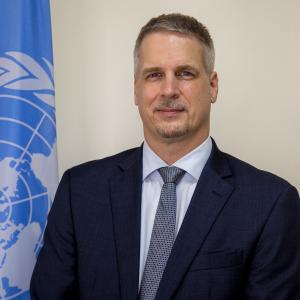Members of UNCT and PMT, UN colleagues
Welcome to this important opportunity to come together and review and strengthen the PHT.
At the outset, let me welcome the new head of OCHA in the Pacific – Mr. Tareq Talahma. Tareq brings a wealth of experience in humanitarian response, having held senior roles in humanitarian and development affairs at UN headquarters and in Syria, Afghanistan, Pakistan, Somalia, Yemen, and other countries. We are very pleased to have you join us.
Colleagues, as we meet, COP28 will shortly get underway in Dubai. It will include the first global stock take against the Paris Agreement. What we already know is that we are well off track to reduce emissions and keep global temperature rise to 1.5 degrees.
Rather, the world is heading for 2.5 degrees warming. We must urgently change course and curb global emissions. And yet even if the world does take the rapid action needed, we are already at 1.2 degrees warming and face a future of increasing intensity of tropical cyclones, storm surges, droughts, floods and heat waves. And we know that such extreme weather events and disasters wipe out developed gains and can increase instability and conflict.
What does this mean for our Blue Pacific?
Unfortunately, it means an increasing need for humanitarian response at speed and scale.
And that’s why today is so critical. Our Pacific humanitarian response mechanism must be effective, efficient, inclusive and future focused.
In the room today we have incredible experience in humanitarian preparedness and response in the Pacific and elsewhere, and we will review where we have succeeded, where we could have done better.
In discussions today, I encourage us all to be open, solutions-focused, and innovative.
Let’s build a Pacific Humanitarian Team that brings coordination, inclusivity, and innovation to alleviate human suffering and protect the lives, livelihoods, and dignity of all people in need in the Pacific.
Thank you!




